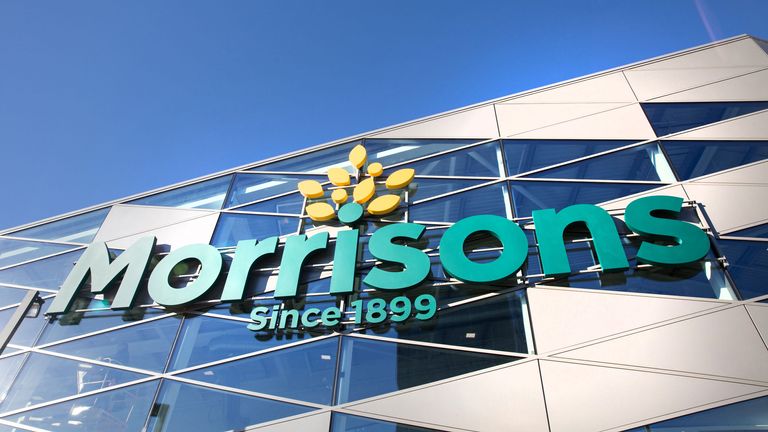Morrisons has defended increased executive rewards as profits tumbled during the coronavirus crisis last year, following a massive investor revolt.
Just over 70% of votes cast at the supermarket chain’s annual general meeting (AGM) rejected the remuneration report for its last financial year.
In advance of the virtual meeting, Sky News reported that several investor advisory groups had recommended shareholders vote against on the grounds that the way the company calculated chief executive David Potts’ pay package meant it was not damaged by a halving of annual profits to £201m.
Image: David Potts had said the profit fall was a ‘badge of honour’ for the chain after its hard work in feeding the nationThe performance was blamed at the time on the cost of handling the COVID-19 crisis.
Mr Potts took home £4.2m in the year to 31 January compared to just under £4m in the previous 12 months.
AdvertisementBut while investors may have seen the package – including an annual bonus of £1.7m – as a reward for failure, Morrisons remained unrepentant in its response to the non-binding vote.
Morrisons said its remuneration committee felt that, having been instructed to feed the nation, management should not be penalised for the £290m bill it faced from the crisis.
More on Morrisons Morrisons eyes stronger profits ahead as sales growth slows Supermarket delivery driver rescued from top of van stuck in swollen Durham river Solihull: Carjackers with axe threaten woman shopping with young daughter Coronavirus costs of £155m take gloss off profits at Morrisons Morrisons and Amazon same-day deliveries to expand across UK Lack of royal wedding among reasons for supermarket slowdownIt also pointed out that the CEO had waived a basic salary increase for a sixth straight year.
The company said that it was a matter of “sincere regret” to the committee that it had not been able to convince a majority of shareholders, or the proxy voting agencies, that exercising discretion was the right course of action.
But it added: “The committee looks forward to re-engaging with shareholders, listening to their views, and once again making the case for why discretion was used in a genuinely exceptional year which produced a genuinely exceptional performance from the executive leadership.”
